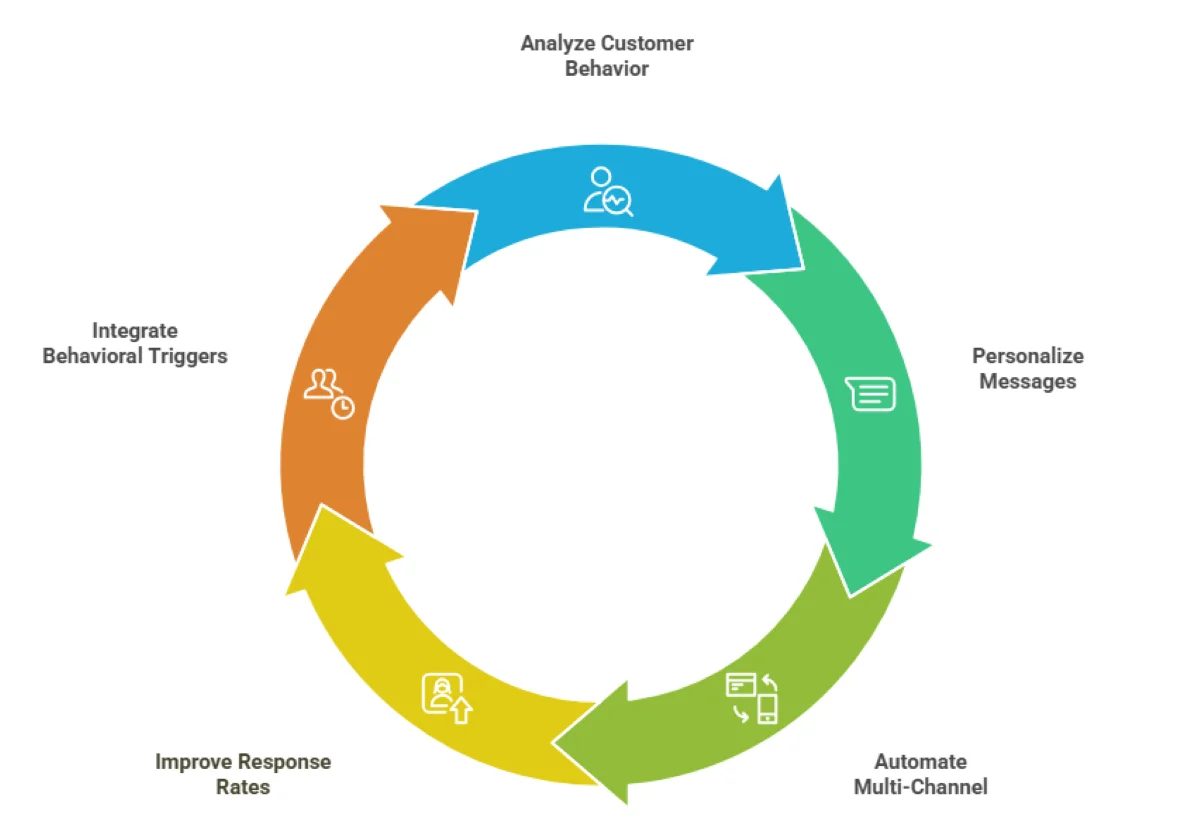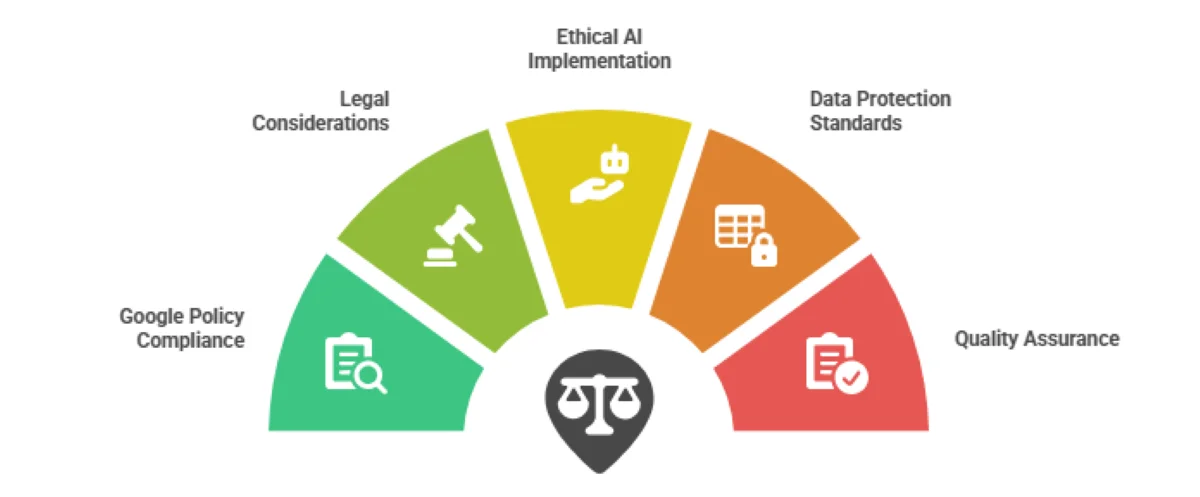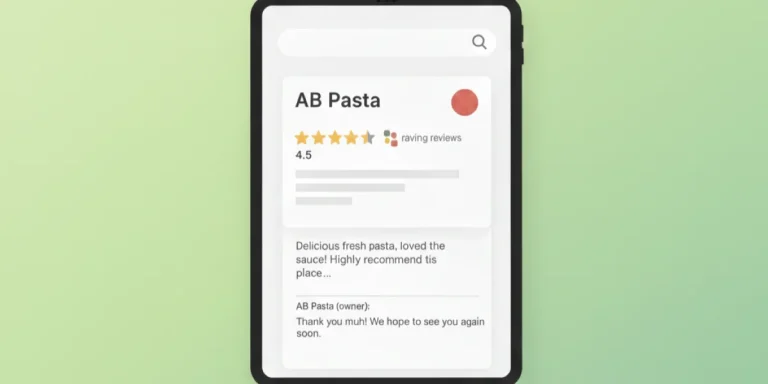
The coffee shop owner refreshes her Google My Business page for the third time today, hoping to see new customer feedback appear. Meanwhile, across town, a dental practice struggles to maintain consistent review collection despite excellent patient satisfaction scores. These scenarios reflect a common business challenge that advanced AI Google Reviews solutions are now transforming into competitive advantages.
Current data reveals that 83% of US consumers now turn to Google to evaluate local businesses in 2025, while 98% of consumers read online reviews for local businesses before making purchasing decisions.
AI-powered review systems eliminate traditional inefficiencies by automating optimal timing, personalizing outreach, and optimizing response rates. This guide demonstrates how enterprises can leverage intelligent automation to accelerate review generation, enhance local SEO performance, and drive measurable business growth.
How does AI transform review generation?

AI revolutionizes review collection by replacing inefficient manual processes with intelligent, data-driven automation that maximizes customer engagement and response rates across multiple touchpoints.
Smart timing
AI algorithms analyze customer behavior patterns, transaction histories, and engagement data to identify optimal moments when customers feel most satisfied and likely to leave positive reviews.
Personalization
Advanced AI platforms customize review request messages based on customer demographics, purchase history, service interactions, and communication preferences, increasing relevance and response rates significantly.
Multi-channel automation
Intelligent systems coordinate review requests across email, SMS, in-app notifications, and social media platforms, ensuring consistent messaging while avoiding over-communication that damages customer relationships.
Response rate improvement
While specific performance metrics vary by implementation and industry, properly configured AI-powered systems can achieve meaningful improvements in response rates compared to manual review collection methods.
Behavioral trigger integration
AI monitors customer journey touchpoints, automatically initiating review requests after positive interactions like successful purchases, resolved support tickets, or completed service appointments.
Four-week deployment plan for AI-powered review generation

Strategic AI implementation requires systematic planning and execution across four critical weeks to ensure optimal performance, compliance, and sustainable growth outcomes for enterprises.
Week 1: Foundation
Building robust infrastructure foundations enables successful AI implementation while ensuring compliance with platform policies and establishing reliable data collection systems for enhanced performance.
Google My Business optimization
Complete the business profile verification, accurate contact information, high-quality images, detailed service descriptions, and proper category selection to maximize review visibility and local search performance.
Customer data collection setup
Implement thorough CRM integration, contact information capture systems, transaction tracking, customer journey mapping, and preference management to enable personalized AI-driven review campaigns.
Compliance framework
Establish Google review policy adherence, legal requirement documentation, ethical AI guidelines, customer consent processes, and audit trail systems to maintain platform compliance and reputation.
Technical infrastructure
Configure secure data storage, API access credentials, integration testing environments, backup systems, and performance monitoring tools to support reliable AI operations and scalability.
Team training
Develop staff understanding of AI systems, compliance requirements, customer communication protocols, escalation procedures, and performance metrics to ensure successful implementation and ongoing optimization.
Week 2: AI Tool selection
Thorough platform evaluation ensures enterprises select AI solutions that align with business objectives, integrate seamlessly with existing systems, and deliver superior ROI outcomes
Platform comparison
Evaluate leading solutions based on features, automation capabilities, customization options, reporting dashboards, and integration flexibility for optimal business fit.
Integration assessment
Analyze compatibility with existing CRM systems, email platforms, POS systems, website infrastructure, and third-party applications to ensure seamless data flow and operational efficiency.
Cost analysis
Calculate total implementation costs, monthly subscription fees, per-transaction charges, integration expenses, and training requirements to determine accurate ROI projections and budget allocation.
Scalability evaluation
Assess platform capacity for business growth, feature expansion possibilities, multi-location support, team collaboration tools, and enterprise-grade security to support long-term advancement objectives.
Support evaluation
Review vendor support quality, documentation comprehensiveness, training resources, implementation assistance, and ongoing technical support to ensure successful deployment and optimization.
Week 3: Workflow configuration
Strategic workflow design maximizes AI effectiveness by establishing optimal trigger points, personalizing customer communications, and implementing quality control processes for consistent performance.
Trigger point identification
Define specific customer actions, satisfaction indicators, service completion events, purchase milestones, and engagement signals that activate automated review requests for maximum response rates.
Message template development
Create personalized communication templates, brand voice guidelines, customer segmentation rules, A/B testing variations, and dynamic content insertion to enhance relevance and effectiveness.
AI training implementation
Configure machine learning algorithms with historical customer data, response patterns, successful message examples, brand voice samples, and performance benchmarks for optimal personalization.
Quality control systems
Establish approval workflows, message review processes, compliance checks, testing procedures, and performance validation to ensure consistent quality and policy adherence.
Performance monitoring setup
Install tracking systems for response rates, review generation volume, customer sentiment analysis, conversion metrics, and ROI measurement to enable data-driven optimization.
Week 4: Launch and optimize
Systematic launch execution with comprehensive monitoring and rapid optimization ensures maximum performance outcomes while maintaining customer satisfaction and compliance standards.
Go-live checklist
Complete final system testing, staff training verification, compliance documentation, backup procedures, and emergency protocols before activating automated review collection campaigns.
Performance monitoring
Track real-time metrics including message delivery rates, customer response rates, review generation volume, sentiment analysis, and system performance to identify optimization opportunities.
Initial optimization
Analyze early performance data, adjust message timing, refine targeting criteria, update templates, and optimize trigger points to maximize effectiveness and customer satisfaction.
Feedback integration
Collect customer feedback, staff observations, performance insights, and system recommendations to inform continuous improvement strategies and enhanced AI training.
Scaling preparation
Evaluate expansion opportunities, additional feature implementation, integration enhancements, and performance improvements to support continued growth and competitive advantage.
Top AI platforms for review acquisition in 2025
Note: Pricing information is subject to change. Contact vendors directly for current rates and custom enterprise pricing.
| Platform | Key Features | Pricing Range* | Best For | Integration Options | Unique Advantages |
| Spreadical | AI auto-replies, smart sentiment analysis, multi-location dashboard | Starting at $39/month | Solo businesses to multi-location brands | Google Business Profiles, email systems | Customizable reply tone & style |
| Reviewly.ai | Smart timing, personalized messaging, multi-channel automation | Starting at $39.99/month | Small to medium businesses | CRM, email platforms, and POS systems | Advanced personalization algorithms |
| EmbedSocial | Social proof widgets, automated collection, analytics dashboard | Pricing varies by plan | Businesses focused on social proof | Website builders, social platforms | Strong visual review displays |
| Birdeye | Enterprise-grade automation, reputation management, and analytics | Starting at $299/month (Starter plan) | Large enterprises, multi-locations | Comprehensive CRM and business tools | Enterprise security and scalability |
| MARA Solutions | AI-powered responses, sentiment analysis, brand voice training | Starting at €30/month (~$32 USD) | Businesses prioritizing response quality | Review platforms, social media | Advanced response generation |
| Podium | Multi-channel messaging, customer communication, and review collection | Starting at $599/month per location | Service-based businesses | Appointment systems, payment platforms | Integrated customer communication |
*Pricing information as of 2025 – contact vendors for current rates and enterprise pricing
Comparative review of leading AI review platforms
Leading AI review platforms offer specialized capabilities designed to meet diverse business requirements, from solo entrepreneurs to enterprise organizations seeking comprehensive reputation management solutions.
Spreadical
Comprehensive three-tier pricing structure serving businesses of all sizes with scalable AI-powered review management capabilities, customizable automation features, and dedicated support systems.
Key Features:
- Instant Google review sync: Automatically fetch every new Google review in real time without manual monitoring, ensuring immediate awareness of customer feedback and rapid response opportunities.
- AI-smart reply drafts: Generate ready-to-send, on-brand replies crafted by artificial intelligence to match business tone and customer sentiment for consistent, professional communication quality.
- WhatsApp review control: Approve, edit, or auto-post replies to Google reviews directly through WhatsApp integration, enabling convenient mobile management and rapid response capabilities.
Reviewly.ai
Advanced personalization algorithms and smart timing optimization make this platform exceptional for businesses prioritizing customer engagement quality and response rate optimization.
Key Features:
- Personalization engine: Advanced machine learning creates highly customized messaging based on customer data, purchase history, and interaction preferences for maximum relevance and engagement.
- Multi-channel coordination: Platform synchronizes review requests across email, SMS, and in-app notifications while preventing over-communication and maintaining professional customer relationships.
- Integration flexibility: Seamless connectivity with popular CRM systems, email platforms, and POS systems ensures smooth operational integration and comprehensive data management.
EmbedSocial
Strong visual review display capabilities and social proof integration distinguish this platform as optimal for businesses wanting prominent customer feedback showcasing.
Key Features:
- Visual review widgets: Advanced display technology creates attractive review showcases for websites, landing pages, and marketing materials that enhance credibility and conversion rates.
- Social proof integration: Comprehensive social media review collection and display capabilities strengthen brand reputation across multiple online platforms and customer touchpoints.
- Website builder compatibility: Native integration with popular website builders and content management systems enables easy implementation without technical expertise or development resources.
Birdeye
Enterprise-grade security, comprehensive CRM integration, and advanced analytics make this platform the preferred solution for large organizations requiring sophisticated reputation management.
Key Features:
- Multi-location management: Centralized dashboard enables businesses to manage review collection and response across hundreds of locations with a consistent brand voice and operational efficiency.
- Advanced analytics platform: Comprehensive reporting and business intelligence tools provide deep insights into customer sentiment, performance trends, and competitive positioning for strategic decision-making.
- CRM integration depth: Native connectivity with major enterprise CRM systems ensures seamless data flow, customer journey tracking, and comprehensive business intelligence integration.
MARA solutions
Specialized AI response generation and advanced brand voice training capabilities position this platform for businesses prioritizing high-quality automated responses.
Key features:
- Brand voice training: Advanced AI algorithms learn specific brand personality, communication style, and industry terminology to generate contextually appropriate responses, maintaining brand consistency.
- Sentiment analysis depth: Advanced emotion detection and context understanding enable nuanced responses that address specific customer concerns and demonstrate genuine business care.
- Multi-language support: Comprehensive language capabilities enable businesses to respond appropriately to international customers while maintaining cultural sensitivity and communication effectiveness.
Podium
An integrated customer communication platform combining review collection with multi-channel messaging creates comprehensive customer engagement solutions beyond traditional review management.
Key features:
- Unified communication hub: A Single platform manages customer interactions across SMS, email, web chat, and review requests, streamlining communication workflows and improving response efficiency.
- Service business optimization: Specialized features for appointment-based businesses include automated follow-up sequences, service completion triggers, and customer satisfaction measurement integration.
- Team collaboration tools: Multi-user access, conversation assignment, and performance tracking features enable efficient team management and consistent customer service quality.
Disclaimer: Pricing information is subject to change. All statistics and pricing details should be verified with vendors directly. This guide is for informational purposes and does not constitute legal or business advice.
Regulatory compliance for AI Google reviews systems

Strategic compliance ensures sustainable AI implementation while maintaining Google policy adherence, legal compliance, and ethical business practices that protect reputation and competitive positioning.
Google policy compliance
Adhere strictly to Google’s review policies by avoiding incentivized reviews, preventing fake submissions, maintaining authentic customer interactions, and ensuring transparent review collection processes.
Legal considerations
Understand consumer protection regulations, data privacy requirements, consent management obligations, cross-border compliance issues, and industry-specific legal requirements that affect review collection practices.
Ethical AI implementation
Maintain transparency in automated communications, respect customer preferences, provide opt-out mechanisms, avoid manipulative practices, and ensure AI systems serve customer interests alongside business objectives.
Data protection standards
Implement robust customer data security, privacy protection measures, consent management systems, data retention policies, and compliance documentation to meet regulatory requirements and build trust.
Quality assurance
Establish review authenticity verification, spam detection systems, compliance monitoring processes, regular audit procedures, and continuous improvement protocols to maintain platform integrity and reputation.
Key metrics for assessing AI review system effectiveness
Comprehensive performance measurement enables businesses to quantify AI review system impact, optimize strategies, and demonstrate clear return on investment through data-driven insights.
Key metrics tracking
Monitor review volume increases, response rate improvements, average rating enhancements, local search ranking improvements, and website traffic growth to measure comprehensive system performance.
ROI calculation methods
Calculate return on investment by comparing implementation costs against increased revenue from improved online reputation, higher conversion rates, and reduced customer acquisition expenses.
Performance benchmarking
Establish baseline metrics before AI implementation, track progress monthly, compare against industry standards, and adjust strategies based on performance data and competitive analysis.
Long-term impact assessment
Evaluate sustained improvements in brand reputation, customer loyalty metrics, repeat business rates, referral generation, and overall market positioning to understand comprehensive AI system value.
Assessing the business outcomes of AI review automation
Strategic measurement frameworks enable businesses to quantify AI system effectiveness, demonstrate ROI, and optimize performance through comprehensive analytics and business intelligence integration.
Tracking conversions
Monitor how increased review volume and improved ratings translate into website traffic growth, lead generation improvements, sales conversion increases, and customer acquisition cost reductions.
SEO ranking analysis
Measure local search performance improvements, keyword ranking enhancements, Google My Business visibility increases, and organic traffic growth resulting from enhanced review profiles and ratings.
Lead volume assessment
Track correlation between review system implementation and lead generation improvements, customer inquiry increases, appointment booking growth, and overall business development success metrics.
Frequently asked questions
How does AI help businesses get more Google reviews?
AI automates review requests by identifying optimal timing based on customer satisfaction indicators, personalizes messages using customer data, and coordinates multi-channel outreach to maximize response rates while maintaining compliance with Google policies.
What is the best time to request a Google review from a customer?
AI determines optimal timing by analyzing individual customer behavior patterns, but generally, the best moments occur 24-48 hours after positive service completion, successful problem resolution, or satisfaction survey responses indicating high customer satisfaction levels.
Can you use AI to generate Google reviews?
No, AI cannot and should not generate fake reviews, but it can automate authentic review collection by identifying satisfied customers, personalizing outreach messages, and optimizing request timing to encourage genuine customer feedback while maintaining platform compliance.
Can AI send personalized review requests?
Yes, Advanced AI platforms personalize review requests using customer names, service details, purchase history, and communication preferences to create relevant, engaging messages that significantly improve response rates compared to generic review requests.
How can AI help avoid fake or non-compliant reviews?
AI maintains compliance by tracking customer authenticity, preventing duplicate requests, ensuring genuine service relationships, monitoring review patterns for anomalies, and implementing verification processes that align with Google’s review policies.
Which AI tools work best for Google review generation?
Top AI tools include platforms with advanced personalization capabilities, comprehensive enterprise features, social proof integration, and automated response management, with selection depending on business size, budget, and integration requirements.
How can AI monitor reviews in real time?
AI systems continuously scan Google My Business, review platforms, and social media for new feedback, providing instant notifications, sentiment analysis, priority flagging for negative reviews, and comprehensive reputation monitoring across multiple channels.
Can AI write responses to both positive and negative reviews?
Yes, AI generates contextually appropriate responses for all review types, creating grateful acknowledgments for positive feedback and empathetic, solution-focused replies for negative reviews while maintaining consistent brand voice and professional standards.
How do Google reviews impact local SEO rankings?
Online reviews contribute to about 17% of search engine rankings for local businesses, with AI systems optimizing review quantity, rating quality, review frequency, keyword relevance, and customer engagement signals to improve search visibility and competitive positioning.
What metrics should I track when using AI for reviews?
Essential metrics include review volume growth, average rating improvements, response rate increases, local search ranking changes, website traffic growth, conversion rate enhancements, and customer acquisition cost reductions to measure comprehensive system effectiveness.
Are AI-powered review systems expensive for small businesses?
AI review systems offer scalable pricing starting around $30-40 monthly for basic features, with ROI typically achieved within 2-3 months through increased customer acquisition, improved conversion rates, and enhanced local search visibility benefits.


